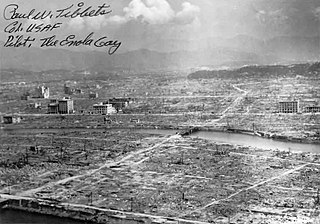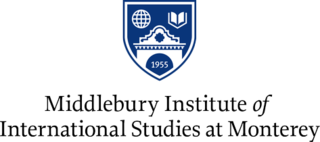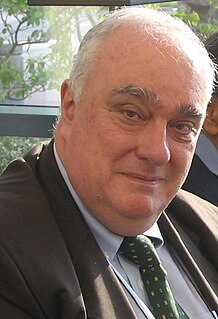Related Research Articles

The Treaty on the Non-Proliferation of Nuclear Weapons, commonly known as the Non-Proliferation Treaty or NPT, is an international treaty whose objective is to prevent the spread of nuclear weapons and weapons technology, to promote cooperation in the peaceful uses of nuclear energy, and to further the goal of achieving nuclear disarmament and general and complete disarmament. Between 1965 and 1968, the treaty was negotiated by the Eighteen Nation Committee on Disarmament, a United Nations-sponsored organization based in Geneva, Switzerland.

Nuclear proliferation is the spread of nuclear weapons, fissionable material, and weapons-applicable nuclear technology and information to nations not recognized as "Nuclear Weapon States" by the Treaty on the Non-Proliferation of Nuclear Weapons, commonly known as the Non-Proliferation Treaty or NPT. Proliferation has been opposed by many nations with and without nuclear weapons, as governments fear that more countries with nuclear weapons will increase the possibility of nuclear warfare, de-stabilize international or regional relations, or infringe upon the national sovereignty of nation states.

Nuclear disarmament is the act of reducing or eliminating nuclear weapons. It can also be the end state of a nuclear-weapons-free world, in which nuclear weapons are completely eliminated. The term denuclearization is also used to describe the process leading to complete nuclear disarmament.

Disarmament is the act of reducing, limiting, or abolishing weapons. Disarmament generally refers to a country's military or specific type of weaponry. Disarmament is often taken to mean total elimination of weapons of mass destruction, such as nuclear arms. General and Complete Disarmament was defined by the United Nations General Assembly as the elimination of all WMD, coupled with the “balanced reduction of armed forces and conventional armaments, based on the principle of undiminished security of the parties with a view to promoting or enhancing stability at a lower military level, taking into account the need of all States to protect their security.”

The Pugwash Conferences on Science and World Affairs is an international organization that brings together scholars and public figures to work toward reducing the danger of armed conflict and to seek solutions to global security threats. It was founded in 1957 by Joseph Rotblat and Bertrand Russell in Pugwash, Nova Scotia, Canada, following the release of the Russell–Einstein Manifesto in 1955.

The nuclear weapons debate refers to the controversies surrounding the threat, use and stockpiling of nuclear weapons. Even before the first nuclear weapons had been developed, scientists involved with the Manhattan Project were divided over the use of the weapon. The only time nuclear weapons have been used in warfare was during the final stages of World War II when USAAF B-29 Superfortress bombers dropped atomic bombs on the Japanese cities of Hiroshima and Nagasaki in early August 1945. The role of the bombings in Japan's surrender and the U.S.'s ethical justification for them have been the subject of scholarly and popular debate for decades.

The Middlebury Institute of International Studies at Monterey (MIIS), formerly known as the Monterey Institute of International Studies, is an American graduate school of Middlebury College, a private college in Middlebury, Vermont.

The Nuclear Age Peace Foundation (NAPF) is a non-profit, non-partisan international education and advocacy organization. Founded in 1982, NAPF is composed of individuals and organizations from all over the world. It has consultative status to the United Nations Economic and Social Council and is recognized by the UN as a Peace Messenger Organization.

Patricia Lewis is a British and Irish nuclear physicist and arms control expert, who is currently the Research Director for International Security at Chatham House. She is also currently Co-Director of the Global Commission on Internet Governance. She was previously the Senior Scientist-in-Residence and Deputy Director at the James Martin Center for Nonproliferation Studies at Monterey Institute of International Studies (MIIS). She was previously the Director of the United Nations Institute for Disarmament Research (UNIDIR) and the Director of VERTIC.

Jonathan Granoff is an American lawyer, screenwriter and lecturer, widely known as President of the Global Security Institute.
Lawrence S. Wittner is an American historian who has written extensively on peace movements, foreign policy, and economic inequality.

The Rideau Institute is a non-profit independent research and advocacy group based in Ottawa. It focusses on foreign policy and defence policy issues.

Yukiya Amano was a Japanese diplomat and the Director General of the International Atomic Energy Agency (IAEA). Amano previously served as an international civil servant for the United Nations and its subdivisions. On 22 July 2019, IAEA announced that Amano had died.
Iran convened a conference titled "International Disarmament and Non-proliferation: World Security without Weapons of Mass Destruction" on 17 and 18 April 2010 in Tehran. The theme of the conference was Nuclear Energy for All, Nuclear Weapons for No One.
The 2010 Review Conference for the Treaty on the Non-Proliferation of Nuclear Weapons (NPT) was held at United Nations Headquarters in New York City from 3 to 28 May 2010. The President of the Review Conference is Ambassador Libran N. Cabactulan of the Philippines. UN Secretary-General Ban Ki-moon used the opening of the conference to note that "sixty five years later, the world still lives under the nuclear shadow".
The Nuclear Studies Institute was founded in 1995 at American University in Washington, D.C. as a component of the American University College of Arts and Sciences. The purpose of the Institute is to educate American University graduate and undergraduate students, as well as the general public, about the key points of nuclear history, nuclear culture in the United States, and the threats still posed by nuclear weapons in the modern world.

Paolo Cotta-Ramusino has been Secretary General of Pugwash Conferences on Science and World Affairs since August 2002. He is also Professor of Mathematical Physics at the University of Milan (Italy) and Senior Researcher at the Italian National Institute of Nuclear Physics. Cotta-Ramusino is an adjunct Professor, Centre of International Politics, Organization and Disarmament, School of International Studies, Jawaharlal Nehru University, New Delhi and an Associate with the Project on Managing the Atom, Belfer Center for Science and International Affairs, John F. Kennedy School of Government, Harvard University. He is a member of the International Institute for Strategic Studies, and the World Academy of Art and Sciences.
Ambassador Thomas Graham Jr. is a former senior U.S. diplomat. Graham was involved in the negotiation of every single international arms control and non-proliferation agreement from 1970 to 1997. This includes the Strategic Arms Limitation Talks, the Strategic Arms Reduction Treaties, the Anti-ballistic missile (ABM) Treaty, Intermediate-Range Nuclear Forces Treaty (INF) Treaty, Treaty on the Non-Proliferation of Nuclear Weapons Treaty (NPT), Treaty on Conventional Armed Forces in Europe (CFE) Treaty and Comprehensive Nuclear-Test-Ban Treaty (CTBT). In 1993, Ambassador Graham served as acting director of the Arms Control and Disarmament Agency (ACDA) from January to November, 1993 and Acting Deputy Director from November, 1993 to July, 1994. From 1994 through 1997, he was president Bill Clinton's special representative for Arms Control, Non-Proliferation, and Disarmament. Graham successfully led the U.S. government efforts to achieve the permanent extension of the NPT in 1995. Graham also served for 15 years as the general counsel of ACDA. Throughout his career, Thomas Graham has worked with six U.S. Presidents including Presidents Richard Nixon, Gerald Ford, Jimmy Carter, Ronald Reagan, George H. W. Bush, and Bill Clinton. Ambassador Graham worked on the negotiation of the Chemical Weapons Convention and the Biological Weapons Convention and managed the Senate approval of the ratification of the Geneva Protocol banning the use of chemical and biological weapons in war, as well as the Biological Weapons Convention.
Golden Rule is the first boat to engage in environmental direct action in the world. It is currently operated by Veterans for Peace. As of summer of 2017, Golden Rule is actively sailing to promote nuclear non-proliferation and disarmament.
References
- ↑ "Home | The Current with Matt Galloway | CBC Radio".
- ↑ CTV.ca
- ↑ "Wade Huntley: The word warrior". www.asianpacificpost.com. Archived from the original on 2008-05-16.